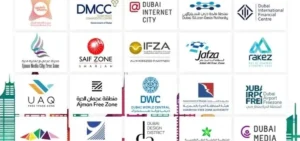For entrepreneurs and investors alike, the UAE is a great place to do business. It has the best business structure options to select from. Business types in the UAE include offshore jurisdictions, free zones, mainland, offshore limited liability companies, sole proprietorships, civil companies, subsidiary companies, offshore companies, and more.
All these corporate structure types come with their pros and cons. So, to build a successful business, it is important to choose the best business structure that aligns with your business requirements. This blog post will discuss the different types of business structures that exist in the UAE.
Understanding Business Formation Structures in the UAE
The UAE has emerged as a global business destination, attracting local and international businesses. One of the factors contributing to its popularity is the range of options to select from when it comes to the company structure.
Let’s take a closer look at the UAE legal structures for businesses.
Offshore Company
Offshore companies are those that can operate from any other country but not the UAE. For this, you don’t need any office space in the United Arab Emirates. Their activities include asset protection, tax, and business confidentiality.
Benefits
- Tax-free: Offshore companies are not liable to any corporate tax or VAT, which makes them very appealing, especially when targeting an international market.
- Foreign ownership: Offshore business operations in certain UAE jurisdictions (such as the Jebel Ali Free Zone or Ras Al Khaimah International Corporate Centre) can be fully owned by foreign nationals.
- No Minimum Capital Requirement: Many offshore jurisdictions in the UAE do not impose a minimum capital requirement, making it easier for entrepreneurs to start a business with low initial investment.
- Cost-effective: The cost of offshore company formation in the UAE remains lower than that of other business structures in the country.
Drawbacks
- Limited market access: An offshore company is prohibited from participating in the UAE’s local business market, which limits local dealings with businesses.
- Restrictions on activities: Offshore business operations are not allowed to trade or have a presence in the UAE mainland.
- Banking restrictions: An offshore company might have trouble opening a local bank account because of its non-resident status.
Free Zone Company (FZC)
A Free Zone Company (FZC) is one of the best business structure options. Free zones in the UAE eliminate or minimize tax rates, provide full ownership to foreigners, and simplify the business formation process.
The UAE has more than 40 Free Zones, each catering to different industries and business needs, such as technology, media, finance, trade, manufacturing, and logistics.
Benefits
- 100% foreign ownership: In a Free Zone Company (FZC), foreign entrepreneurs enjoy complete ownership of their company without having to partner with a local national.
- Tax exemptions: Free zone companies are given tax exemptions for a limited period, which can extend up to 50 years, in which case renewals are possible.
- Ease of business setup: The process of Free Zone company formation is easy and quick.
- No customs duties: Companies within the free zones are exempted from customs duties on imports and exports.
Drawbacks
- Restricted to Free Zone Operations: Companies located in free zone regions are required to conduct business activities in that region and engage in international business. They are unable to work directly in the UAE mainland market.
- Non-Availability of UAE Business Opportunities: Free Zone Company (FZC) areas are exclusively occupied by foreign firms. These companies can operate only in the free zone and can’t sell directly to UAE businesses unless through local distributors or agents.
- Restrictions on Types of Operations: Restrictions within the free zones regarding the type of operations that would be performed could limit the form of company structure options that could be used.
Mainland Company Formation
A UAE mainland company, or, instead, a UAE-registered company, is defined as a company mandated to register anywhere in the Emirates of the UAE and authorized to operate within the borders of the UAE as well as outside of it.
The mainland company structure has unlimited operating autonomy in the UAE market, which broadens the scope of the company itself. They are under the jurisdiction of the UAE business laws and have to adhere to specific rules, including getting a mainland business license to operate businesses within the boundaries of the country.
Benefits
- Opportunities in the UAE: Mainland companies are permitted to do business anywhere in the UAE and with other businesses.
- Services: The range of services offered by mainland companies encompasses everything from international trade to local service providers and heavy industrial works.
- No limitations on sectors: Mainland companies have the distinct advantage of not being limited to specific sectors of activities, as is the case with free zone companies.
- Partnership with a local: Foreign ownership may be enabled through collaboration with a local sponsor through a mainland company structure, which makes doing business in a locality easier.
Drawbacks
- Partner requirement: A foreign investor needs to find an Emirati national to be able to run a mainland business in the UAE; this may prove to be inconvenient for many entrepreneurs.
- Higher setup costs: To set up this corporate structure in UAE, you must pay for capital and labor requirements and licensing fees.
- Restructured taxation models: The strategy for introducing the UAE tax system in 2023 would resettle the workload for leading companies, making planning and forecasting longer and more cumbersome.
Limited Liability Companies (LLCs)
In the UAE, a Limited Liability Company (LLC) is a common and decently formed company structure with less taxation. According to local laws, a Limited Liability Company (LLC) provides liability protection to its owners and can be registered on either the mainland or in free zones. However, LLCs in the UAE operate under strict business laws and regulations that dictate their operations.
Benefits
- Self-liability: The personal assets of Limited Liability Company (LLC) shareholders are protected as they are only liable for the company’s business debts to the extent of their capital investment.
- Flexible company structure: From small startups to large-scale businesses, limited liability businesses can cater to all needs, thus providing great flexibility for management and operations.
- Ability to operate in the UAE market: An LLC setup in Dubai or UAE possesses the capability to operate freely within the region and cater to all of its customers.
Drawbacks
- Local sponsorship requirement for investments: Most Limited Liability Companies (LLCs) require their investors to acquire a UAE local partner with 51% ownership of the business’s shares; however, this cost has been raised in certain specific industries and eased for international business owners by reforms.
- Extremely complex structure: Investors in LLCs must be willing to undergo a rigorous, complicated legal procedure to set up the company in the UAE.
- Restricted ownership: An investor investing in a limited liability business often has to share the ownership with a 49% share, which can be very restricting for individuals looking to have complete control.
Public and Private Joint-Stock Companies (PJSC & PrJSC)
Shares of a Public Joint Stock Company (PJSC) are traded on the UAE public stock market, while shares of a Private Joint Stock Company (PrJSC) are privately held and not publicly traded. These types of corporate structures are particularly suited for larger companies or those aiming to raise capital through the sale of shares.
Benefits
- Ability to raise funds: One significant advantage of a Public Joint Stock Company (PJSC) is its ability to issue shares to the public, providing a valuable opportunity for business growth.
- Limited liability: In both the PJSC and PrJSC structures, shareholders’ obligations are limited strictly to their investment in purchasing the shares; therefore, in case of liquidation, no personal assets are subject to seizure.
- Business development: Public and private joint stock companies are ideal for conducting business on a large scale. They are particularly well-suited for those looking to grow and expand by attracting investments and offering shares of the company to the public.
Drawbacks
- Complexity of legal compliance: PJSCs and PrJSCs are governed by UAE business laws, which impose strict regulations requiring robust governance and outlining the associated compliance costs.
- High minimum capital funds: The minimum shareholding requirements in PJSK and PRJSC are so high that some small—to medium-sized businesses may find them a barrier to entry.
- Limited influence on management by the shareholders: Management and control of a PJSC tend to be spread among too many shareholders, with only a few shares held by each, which minimizes the power of each owner.
Why Is Business Structure Important?
In the UAE, choosing the right business structure is crucial for achieving success.
The structure you choose for your company will determine your legal obligations, tax responsibilities, and options for raising capital. Additionally, specific business structures define ownership rights, the composition of the company’s management, and the criteria for regulatory compliance.
For example, if you are an overseas investor planning to set up a business in the UAE, the choice between an LLC and a Free Zone Company is crucial. This decision will impact your access to the local market and your business growth. Additionally, certain structures, like offshore companies, offer tax benefits that can significantly reduce operational costs.
Comparing Business Formation Structures
In the table below, we compare the key features of specific business structures to help you make a more informed decision about the most suitable company formation in Dubai or UAE.
LLC vs. Free Zone Companies
| Feature | Limited Liability Company (LLC) | Free Zone Company (FZC) |
| Foreign Ownership | Up to 49% (with local sponsor) | 100% foreign ownership allowed |
| Market Access | Full access to the UAE market | Limited to Free Zone or international trade |
| Tax Exemption | Subject to corporate tax | Tax exemptions for up to 50 years |
| Setup Process | Complex, requires a local sponsor | Simpler, no local sponsor is required |
| Cost of Formation | Higher setup and maintenance costs | Lower setup costs but restricted scope |
Offshore Companies vs. Mainland Businesses
| Feature | Offshore Company | Mainland Company |
| Foreign Ownership | 100% ownership | Up to 49% (with local sponsor) |
| Market Access | No access to the local market | Full access to the local market |
| Tax Exemption | No corporate tax or VAT | Subject to corporate tax (introduced in 2023) |
| Setup Process | Simple and cost-effective | Requires more documentation and office space |
| Operating Restrictions | Limited to international trade | Wide range of business activities |
Public and Private Joint-Stock Companies
| Feature | Public Joint-Stock Company (PJSC) | Private Joint-Stock Company (PrJSC) |
| Capital Requirements | High minimum share capital | High minimum share capital |
| Shareholder Liability | Limited to the value of shares | Limited to the value of shares |
| Ownership | Publicly traded | Privately owned |
| Regulatory Compliance | Extensive legal and reporting obligations | Less strict compared to PJSCs |
| Ability to Raise Capital | Can raise capital through public offerings | Limited to private investors |
Conclusion
Whether you are considering an offshore company for tax benefits, a free zone company for a simplified setup, or a mainland company for market access, each business structure offers distinct advantages and limitations. By understanding the differences between them, you can make an informed choice that aligns with your company’s objectives, financial goals, and growth plans.
Be sure to consult with legal and financial experts to ensure that your business formation complies with UAE business law and is structured for long-term success in the dynamic UAE market. If you need any help in making a decision or with legal formalities to set up a business in Dubai or UAE, then Connect Group is the best option. We have a qualified team of professionals who are experts in every aspect of business structures in the UAE. Contact us now!






